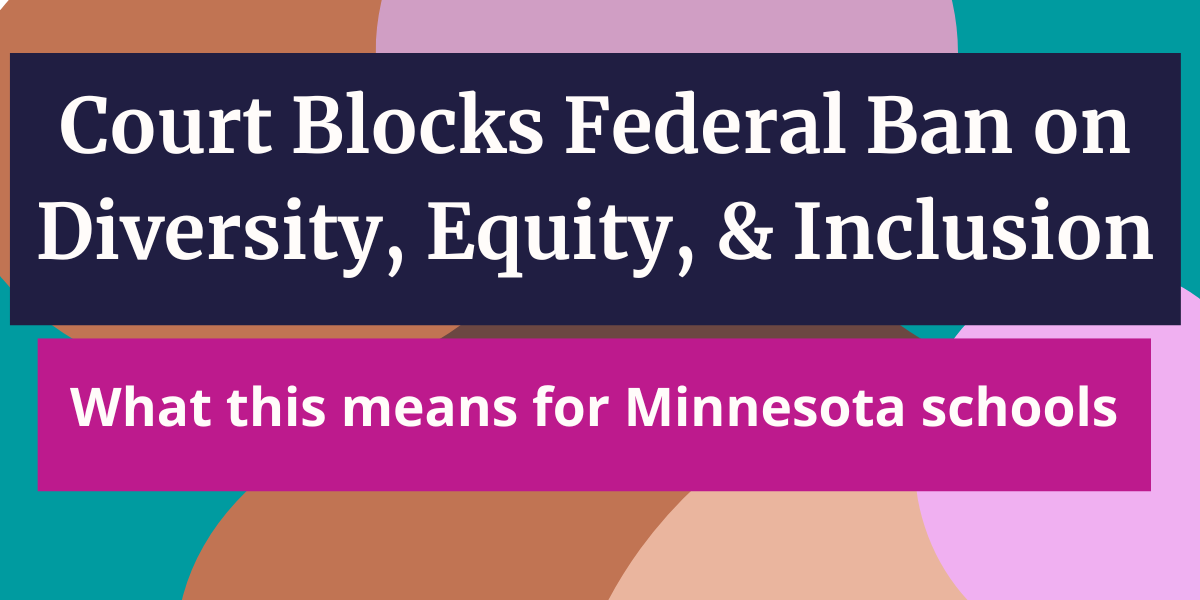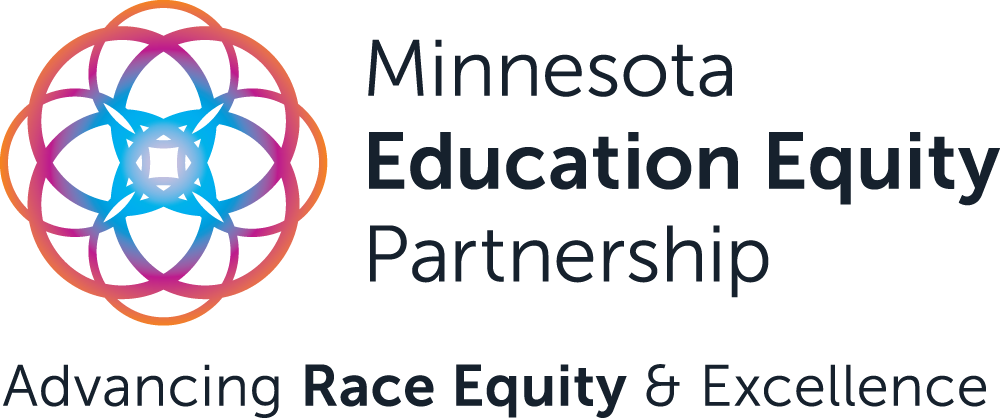
Court Blocks Federal Ban on Diversity, Equity, & Inclusion in Schools
Good News for Minnesota Schools and Student Achievement
On August 14, 2025, a federal court in Maryland permanently struck down the U.S. Department of Education’s attempt to limit diversity, equity, and inclusion (DEI) programs in schools.
The case, AFT et al. v. U.S. Department of Education, challenged a “Dear Colleague” policy letter and new certification rule issued earlier this year that threatened K-12 and Post-Secondary institutions with losing federal funds unless they eliminated their diversity initiatives.
What Was at Stake for Minnesota Schools and Colleges
While Minnesota schools are among the top performers in the nation on many education outcomes ranging from high school graduation to college access and success, they nonetheless suffer from attainment gaps across a diversity of student communities.
To address this, they have increased the use of student support approaches that focus on the unique realities each student community faces, such as racism, language barriers, poverty, various physical disabilities, and geographic isolation.
The US Department of Education’s anti-Diversity, Equity & Inclusion mandates this year left Minnesota schools struggling to make sense of the vague directives. School leaders have been forced to evaluate their risk of losing funding and facing legal action against their knowledge as educators of what it is needed to support the success of every learner.
This ruling provides Minnesota schools and colleges with a reprieve so that they can continue to engage in effective education practices without fear of reprisal.
What the Court Said
Judge Stephanie Gallagher ruled that the Department’s actions were unlawful and violated the Constitution. In her 76-page opinion, she explained that:
- The rules were too vague, leaving educators unsure about what was allowed and threatening schools with the loss of federal funding.
- The Department went beyond its legal authority, trying to control classroom content in ways not permitted by law.
- The directive amounted to viewpoint discrimination, unfairly singling out supporters of DEI and social justice.
Gallagher described the policy as more than just a reminder of existing law. She called it a “sea change” that made many teachers fear that normal, beneficial classroom discussions could suddenly put them or their schools at risk.
This is the first final court ruling on the Trump Administration’s effort to eliminate Diversity, Equity, & Inclusion from schools. Other courts that looked at similar policies have also said they were likely unlawful, so this decision adds to a growing trend of judges rejecting the Administration’s approach.
What Happens Next
The US Department of Education is expected to appeal the ruling. But for now, the decision is a major win for educators and advocates who argue that schools must be able to teach about race, equity, and inclusion without fear of punishment.
At its heart, the ruling sends a clear message: The federal government cannot use its funding power to silence educators or suppress ideas it doesn’t like.
Minnesota’s Legal Protections & Equity Requirements Still Stand
Regardless of shifting and stalled federal directives, Minnesota districts, schools, and educators must continue to uphold and advance racially equitable policies and practices in classroom curriculum, school climates, and student supports.
Minnesota law not only protects every learner’s right to an equitable education, it also requires all schools and districts to implement and uphold racially equitable strategies.
These include culturally responsive instruction, targeted efforts to close racial disparities, and protections for students who face systemic barriers.
Key Minnesota mandates:
- The Minnesota Human Rights Act prohibits discrimination in education based on race, national origin, sex, disability, gender identity, and more.
- The Achievement and Integration Statute requires districts to implement proactive strategies to close racial and economic opportunity gaps.
- The MDE Equity, Diversity, and Inclusion Center continues to advise school leaders with guidance and technical assistance for implementing culturally responsive practice.
- The MDE Language Access and Newcomer Guidance ensures multilingual and immigrant students are supported in compliance with state laws and equity goals.
What Minnesota legal and education leaders are saying:
- The MDE refused to comply with vague federal DEI certification language sent by the U.S. Department of Education.
- Attorney General Keith Ellison issued a formal legal memo (March 5, 2025) reaffirming that Diversity, Equity, & Inclusion initiatives remain legal under state and federal law.
- Minnesota Education Commissioner Willie Jett stated that MDE will continue implementing equity efforts and federal education programs in compliance with existing law.
- Minnesota is part of a multi-state resistance to certification threats aimed at Diversity, Equity, and Inclusion.
How MnEEP Can Support You
With no legal authority to prevent our schools from delivering equitable practices that can support academic achievement for all students, inclusive of students of Color, American Indian students and Emerging Multi-Lingual (EL) students, the need to keep developing the skills on how to best do that must continue.
MnEEP’s Race Equity Training Center (RETC) remains available for professional development and school policy support and advice. Contact us to discuss how we can help your classroom, school, college and also aid in your Minnesota re-licensure needs.
And keep an eye out for our soon to be released online toolkit on learning more about these federal developments and what you can do about them.
Finally, consider becoming a Member of MnEEP. It’s easy and rewarding, including access to our ongoing webinar series on culturally validating education practices and race equity issues.
